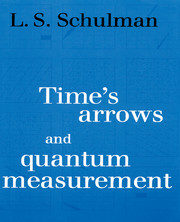Book contents
- Frontmatter
- Contents
- Preface
- 1 Introduction
- 2 Irreversibility
- 3 Arrows of time
- 4 Correlating arrows of time
- 5 Two-time boundary value problems
- 6 Quantum measurements: cats, clouds and everything else
- 7 Existence of special states
- 8 Selection of special states
- 9 Abundance of special states
- 10 Experimental tests
- 11 Conclusions and outlook
- Author index
- Index
8 - Selection of special states
Published online by Cambridge University Press: 05 August 2012
- Frontmatter
- Contents
- Preface
- 1 Introduction
- 2 Irreversibility
- 3 Arrows of time
- 4 Correlating arrows of time
- 5 Two-time boundary value problems
- 6 Quantum measurements: cats, clouds and everything else
- 7 Existence of special states
- 8 Selection of special states
- 9 Abundance of special states
- 10 Experimental tests
- 11 Conclusions and outlook
- Author index
- Index
Summary
Why should special states occur as initial conditions in every physical situation in which they are needed? Half this book has been devoted to making the points that initial conditions may not be as controllable as they seem; that there may be constraints on microscopic initial conditions; that this would not have been noticed; that such constraints can arise from two-time or future conditioning; that in our universe such future conditioning may well be present, although, as remarked, cryptic. In this chapter I will take up more detailed questions: what future conditions could give rise to the need for our ‘special’ states, and why should those particular future conditions be imposed.
Before going into this there is a point that needs to be made. Everything in the present chapter could be wrong and the thesis of Chapter 6 nevertheless correct. It is one thing to avoid grotesque states (and solve the quantum measurement problem) by means of special states and it is another provide a rationale for their occurrence. I say this not only to highlight the conceptual dependencies of the theses in this book, but also because there is a good deal of hand waving in the coming chapter and I don't want it to reflect unfavorably on the basic proposal. As pointed out earlier, the usual thermodynamic arrow of time can be phrased as follows: initial states are arbitrary, final states special.
- Type
- Chapter
- Information
- Time's Arrows and Quantum Measurement , pp. 252 - 267Publisher: Cambridge University PressPrint publication year: 1997



